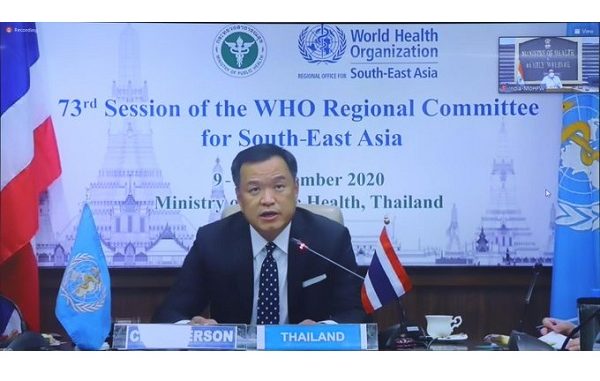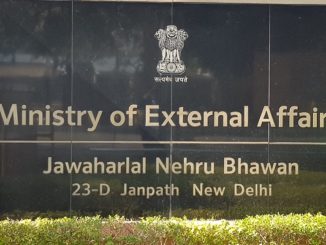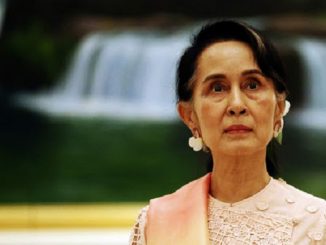
Sep 10: At the conclusion of the 73rd session of WHO Southeast Asia Region held under the Chairmanship of Mr. Anutin Charnvirakul, Deputy Prime Minister and Minister of Health, Thailand, the Health Ministers of the member states agreed to the SEAR Member States’ Declaration on the collective response to COVID-19 in South-East Asia Region.
The text of the declaration is as below:
We, the Health Ministers of the Member States of the WHO South-East Asia Region participating in the Seventy-third session of the WHO Regional Committee for South-East Asia
Concerned by the devastating impact of the COVID-19 pandemic on the physical, mental and social well-being of people, on economies and societies, and in particular by the consequences of disrupted health services, in particular non-COVID-19 essential health care and public health programs, in Member States of the Region,
Recognizing the importance of regional solidarity, and of the regional initiatives which bolster the resilience of health systems in responses to the pandemic, namely the South-East Asia Regional Flagships on Universal Health Coverage and Health Emergencies which scale up capacity in emergency risk management; SEARHEF which provides rapid financial resources during public health emergencies, and the 2019 Delhi Declaration on Emergency Preparedness (SEA/RC72/R1) which commits to scale up capacities in disaster risk management and emergency preparedness in the Region and WHA73 resolution on COVID-19 response (WHA73.1),
HEREBY agree to the following:
· Reaffirm the importance of Universal Health Coverage and Primary Health Care as a safety net for people in accessing quality health services – both COVID-19 and non-COVID-19 – emphasizing the need to prioritize investment in Universal Health Coverage and Primary Health Care to ensure equitable access by all people, including vulnerable populations, to all essential health services, without financial barriers, during the pandemic;
· Strive to sustain essential health services and public health programs, in particular during public health emergencies and to use this opportunity to build back better our health systems;
· Prioritize health of the population and saving lives by allocating adequate health budget to sustain uninterrupted health services during and after the pandemic;
· Strengthen health information systems which capture timely reporting of outbreaks by leveraging digital technologies, and sharing information for policy decision;
· Ensure occupational health, safety and wellbeing of health professionals and other related workers, strengthen safety of patients and the people through adequate public health and social measures, and access to different types of quality personal protective devices;
· Strengthen occupational and environmental safety through appropriate medical waste management system;
· Strengthen biomedical, health policy and systems research on COVID-19 which support national policy decision, and knowledge sharing across SEAR Member States;
· Continue and expand multi-sectoral collaboration, through a whole of government and society approach, to mobilize surge capacity in the society to mitigate the negative consequences of the pandemic; including effective risk communication, community engagement, and management of the infodemic;
· Strengthen regional collaboration to support SEAR Member States in particular strengthening capacity for preparedness, surveillance and rapid response, field epidemiology training, supply chain management of medicines and medical supplies, and regional stockpiling of essential health resources;
· Identify gaps and strengthen core capacities as required by the International Health Regulations 2005;
· Fully engage in global discussion on equitable allocation of vaccines, medicines and diagnostics;
We, the Health Ministers of the Member States of the WHO South-East Asia Region, welcoming and appreciating the support of the WHO Director-General and the Regional Director for South-East Asia Region to boost regional capacities in managing public health emergencies in the Region.
Adopted on the Ten Day of September, Two Thousand and Twenty.
Disclaimer: We donot claim that the images used as part of the news published are always owned by us. From time to time, we use images sourced as part of news or any related images or representations. Kindly take a look at our image usage policy on how we select the image that are used as part of the news.


